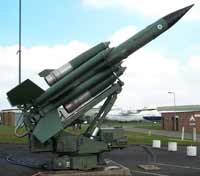USA to deploy thousands of its interceptor missiles globally
Russia ’s Foreign Affairs Minister Sergei Lavrov believes that the US administration plans to deploy elements of its missile defense system in many countries of the world.

“Most likely, we will hear them talking about hundreds and even thousands of interceptor missiles in different parts of the globe, including Europe,” Lavrov said in and interview with the Polish Gazeta Wyborcza newspaper.
The minister specified that objects of the U.S. missile defense system have been created or are being created in Alaska, California and North-Eastern Asia. The minister added that Moscow is deeply concerned about the US strategic infrastructure approaching Russian borders, Interfax reported.
Sergei Lavrov said that the U.S. administration did not even intend to guarantee at least minimum restrictions for the deployment of its global air defense. The Russian minister said that it did not go about a dozen interceptor missiles in Poland and the Czech Republic alone. “The problem is a lot more serious. Does anyone really think that Russia will calmly watch the USA increasing its strategic potential near Russia’s borders?” the minister said.
President Putin touched upon the subject of NATO’s close presence to Russia at the latest session of the Council of State. “The new arms race that one can witness growing in the world today and the absence of any attempts on NATO’s part to find compromises on the problem push Russia towards making adequate decisions to defend its national security,” Putin said.
Vladimir Putin lambasted the West for its military expansion toward Russia's borders and laid out an ambitious agenda for his successor to restore the country's economic and military clout in a farewell address Friday as he prepared to step aside as president.
With less than a month remaining before the election, Putin's speech before dozens of top government officials, cultural figures, religious leaders and military officers served as a report card on his own achievements and a reminder of his wide popularity among Russians, the AP reports.
It was also a signal that "Putinism" - a doctrine of assertive economic and military policies and unwavering centralized power - should be expected to continue under the man he has tapped to succeed him: First Deputy Prime Minister Dmitry Medvedev.
"What I'm saying now is not just being said on the eve of the election. This isn't a campaign slogan. This is of vital necessity for the improvement of the country," he told the audience gathered in an ornate Kremlin palace ballroom.
With the audience interrupting him with applause nearly two dozen times during the more than 45-minute, nationally televised address, Putin again lashed out at "foreign interference" in Russia's internal affairs - a warning aimed at building criticism in the West about how free and fair the March vote will be. On Thursday, an authoritative international group said it would not send observers to monitor the vote.
"Attempts of foreign interference in the course of the political battles within Russia are not only immoral, but also illegal," Putin said.
Speaking forcefully at times and gesturing with his fists, he listed the successes of his tenure, noting the country's rising birth rate and growth of the middle class. He asserted that the rule of law had been restored after what he described as the chaotic years of the 1990s.
"One can say with confidence now that political lawlessness for the people of Russia has ended," he said.
Subscribe to Pravda.Ru Telegram channel, Facebook, RSS!




